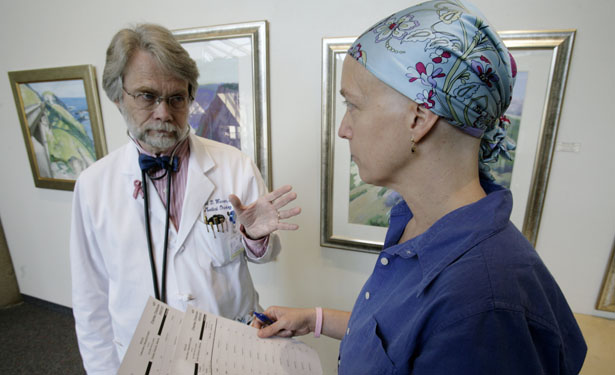Chemo: A Treatment That Could Wind Up Giving You (Another) Cancer
Few cancer patients take notes on chemo dose options and potential long-term side effects.

Jim Bourg/Reuters
When a celebrity gets a serious illness, there's a lot the public might learn. Breast cancer is so common now; we're witnessing its varied manifestations play out in arenas diverse as politics, tennis and TV.
Earlier this week, Good Morning America co-host Robin Roberts announced that she has a blood disorder called myelodysplastic syndrome (MDS). As many viewers already knew, she has a history of breast cancer. She found a lump in the summer of 2007, when she was 46 years old. She had surgery and celebrated completing eight cycles of chemotherapy in January, 2008. Roberts was thriving after all that, she said and appeared.
The new diagnosis came as a shocker, presumably for the anchor and those she holds dear, and particularly for some of the estimated 2.8 million women alive in the U.S. after breast cancer. It jolted more than a few who've watched Roberts' program or, who, like me, followed her personal story from afar. More than a few individuals - and not just women who've had breast cancer - see Roberts as a role model. She's bright, and resilient, and by being so confers hope just by looking healthy and doing what she does most weekday mornings.
Few know about MDS. "When you first told me, I had never heard of it before,"said Roberts' co-host George Stephanopoulos. "I had never heard of it either," Roberts reassured him. The lack of familiarity may be universal among news anchors: Anderson Cooper, among others, said the same on his show.
Myelodysplastic syndrome affects the bone marrow. The condition - typically manifest by low numbers of blood cells - ranges in severity and form. It's uncommon; the NCI estimates over 10,000 cases occur each year in North America. Some doctors refer to MDS as preleukemia, because roughly a third of cases progress to leukemia over time - that might be years, or decades. In cases that don't turn into leukemia, the disorder may be serious: Low white blood cells confers risk for infection; low red cells results in anemia, which causes fatigue and can stress the heart, among other effects; low platelets dispose to severe bleeds. Although MDS can be caused by cancer treatment - such as DNA-damaging chemotherapy or radiation - many cases occur without a known precipitant.
According to the ABC coverage, the condition is a "rare reaction to the chemotherapy treatments that helped her beat breast cancer five years ago..." Now she's preparing for a bone marrow transplant. The donor is her older sister, "a virtually-perfect match," she informed the TV audience. This kind of news can be scary, even terrifying, to anyone who's had apparently successful cancer treatment.
Whether or not Roberts' blood condition is a complication of her treatment, her case highlights a common problem in oncology: Many cancer patients are unaware of the possible long-term effects of the treatments they choose.
I've witnessed this phenomenon from both sides. Doctors, for their part, contribute by not clearly communicating the risks of treatment. Some may not mention the risk of MDS or leukemia at all, or may minimize the possibility if they do so. This can happen with the best of intentions, in an effort to be reassuring and helpful. An oncologist, for example, might say something like:
"Well, you know, the chemo has a lot of side effects. It will make your hair fall out, and it'll probably cause nausea, but we have medicines to help with that. It will lower your immune system, and you'll be prone to infections for a while. These medicines can affect your liver, your lungs, your heart, your kidneys...there's a small chance you might get a cancer down the road...but this is the best treatment we have now for your cancer."
Having heard this, the patient may accept the risk, knowingly, because she's preoccupied about the tumor she has at the time of the discussion. A future leukemia - or myelodysplastic syndrome, if the doctor happens to mention it, which isn't often how these things go - is too abstract to consider.
Patients are responsible, too: Even when a doctor supplies all the information in an appropriate, non-harried manner, the patient may not "hear" what's said. She may not be focused on what the physician's saying, and instead be concentrating on something elsewhere like a pet, a child or a deceased parent. She may be uneducated in science, and fear seeming ignorant. She may be, simply, freaking out, and later have no recollection of the oncologist's words.
Like other women who've had breast cancer, I admire Roberts for her openness. As a blood and cancer specialist, I value her way of conveying information - she's shown other patients what it's like to get chemo, to lose your hair and now, unfortunately, to face a possible complication of treatment.